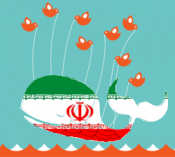Mar
9
Some Things Change; Some Things Don’t
 Posted by Clif Burns at 9:14 pm on March 9, 2010
Posted by Clif Burns at 9:14 pm on March 9, 2010
 Category: Cuba Sanctions • Iran Sanctions • Sudan • Syria • Technology Exports
Category: Cuba Sanctions • Iran Sanctions • Sudan • Syria • Technology Exports
 Here’s what has changed at OFAC. Yesterday OFAC announced a general license for Iran and Sudan that would permit export of
Here’s what has changed at OFAC. Yesterday OFAC announced a general license for Iran and Sudan that would permit export of
certain services and software incident to the exchange of personal communications over the Internet, such as instant messaging, chat and email, social networking, sharing of photos and movies, web browsing, and blogging.
To be eligible the services must be offered free of charge and any software must be EAR99, not subject to the EAR, or mass market software classified under ECCN 5D992. Also, the exporter must not have any reason to believe that the services or software is destined to be used by the government of Sudan or Iran. A similar license was announced for Cuba but it only covered services since BIS controls exports of software to Cuba. Any bets on how long it will take for BIS to act to permit these software exports to Cuba? BIS action will also be necessary for similar exports to Syria.
And here is what hasn’t changed at OFAC. Today OFAC announced that it spent untold tens of thousands of taxpayer dollars to fine some poor schlub $575 for buying Cuban cigars over the Internet. I have to assume that this single cigar purchase will provide funds to the current Cuban government that will keep it in power for about five minutes longer than otherwise would have been the case thereby justifying all the government expense involved in imposing the fine.
 Permalink
Permalink
Copyright © 2010 Clif Burns. All Rights Reserved.
(No republication, syndication or use permitted without my consent.)
5 Comments:

That is truly funny about the fine of $575.00…and so true! In truth, like you, I was not overly impressed with yesterday’s release of OFAC fines and penalties.
I have also noticed that there doesn’t seem to have been many enforcement actions or fines taken against firms for using sanctioned vessels. Do you think this is down to OFAC resource levels or do you think there is another reason?
Did you happen to read “U.S. Enriches Companies Defying Its Policy on Iran” in the New York Times this past Saturday?
http://www.nytimes.com/2010/03/07/world/middleeast/07sanctions.html?hp=&pagewanted=print
If financial institutions inadvertently effected transactions to Iran, they would be severely ($$$$) penalized. However, our federal government for the past ten years has awarded billions “to companies that defied American sanctions law by making large investments that helped Iran develop its vast oil and gas reserves.” It appears there are two set of policies; one for financial institutions and the other for Corporate America.
Regards,
Kelly Yip

Thanks to the existence of TwitPay (www.twitpay.me, note the hosting in Montenegro), support for the revolution isn’t the only thing that tweets to Iran will carry. Using this service, PayPal will send money to and from Twitter accounts.

The general license(s) don’t necessarily make sense to me. Perhaps someone else can clear it up.
The way I see it these general license(s) place U.S. exporters of internet based personal communications software/services in a tough spot. On one hand, they are still prohibited from exporting to the governments of Iran, Sudan, and Cuba. Yet, they need to ensure that the product is publicly available at no cost.
In such a scenario, how are they supposed to monitor whether or not government agents in Iran, Cuba, or Sudan are downloading this software which is, according to the new regulations, required to be publcly available for free.
The regulations require the exporter to make such services available to everyone at no cost, yet at the time places restrictions on who it can be exported to.
Since many of these services require nothing more than the creation of an alias and a password to use an internet based service or software (for example, Yahoo Messenger), how is the exporter supposed to monitor and block certain parties from downloading it. There might be a solution I’m not thinking of, but I forsee this leading to problems down the road. OFAC needs to address this issue as it is bound to come up in the future when some exporter runs afoul of the regulations by unwittingly providing their services to agents of the governments of Iran, Cuba, or Sudan.

@Erich. The general license doesn’t prohibit exports to the governments of Iran, Cuba or Sudan. It prohibits exports when the exporter “knows or has reason to know” that the export is intended for the Government. In most cases of anonymous downloads, that knowledge or reason to know won’t exist.

Clif, thanks for pointing that out. I went back and looked at the regs in the Federal Register and now I see the knowledge requirement. I knew I had to be missing something.
I don’t recall seeing that requirement in the 21 page document that was on OFAC’s website on Tuesday. I tried to go back and find that link, but the link now takes you to the Federal Register section containing the new regulations. Oh well. Thanks for clearing that up, makes more sense now.
 Here’s what has changed at OFAC. Yesterday OFAC announced a general license for Iran and Sudan that would permit export of
Here’s what has changed at OFAC. Yesterday OFAC announced a general license for Iran and Sudan that would permit export of Permalink
Permalink

 Posted by
Posted by  Category:
Category: 

